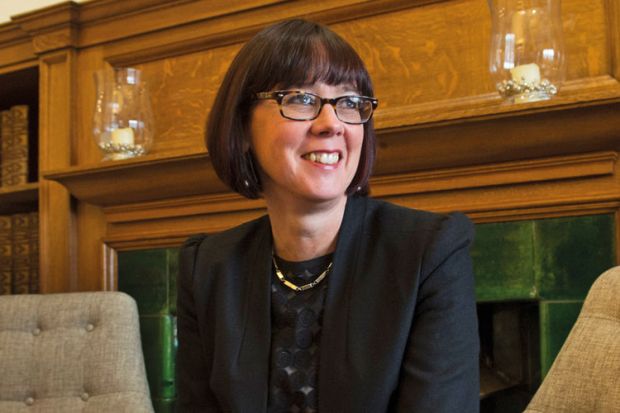Source: Gerallt Llewelyn
Jo Rycroft-Malone (@jorycroftmalone) is head of the School of Healthcare Sciences, professor of implementation and director of research at Bangor University. Last year she was included in Thomson Reuters’ Highly Cited Researchers list. In October she will become director of the health services and delivery research programme run by the National Institute for Health Research – the UK’s largest funding body for applied health research.
Where and when were you born?
At home in Normanton on Trent, 1965.
How has this shaped you?
Later events shaped me more, but I have inherited some Northern grit from my Yorkshire-born parents.
What is the significance of your new position?
The HS&DR programme has funded research that has made a real impact in the NHS, so this role is an exciting opportunity to continue that legacy and support research that makes a difference to services, patients and the public.
The NIHR is the UK’s largest funding body for applied health research, but many have said that research funding needs to be increased across the board. Where do you stand on this?
Unsurprisingly I would always vote for more research money! However, we need to ensure that resources are spread across disciplines: answers to complex challenges come from different perspectives. We have enjoyed good levels of funding for health research and this has put the UK up there as a global leader. If we want to make further inroads, more funding – wisely allocated – has to be a positive thing.
Applied health comfortably meets the “impact” criterion. Does that make it easier or harder to apportion funding?
Applied health research definitely has the potential for impact – but it is not a given. Maximising the chances for impact through, for example, early and sustained engagement between researchers and evidence users including patients and the public has the potential to make sure the right questions are being asked and the research is conducted in a way that generates readily implementable knowledge.
Should pure research that isn’t demonstrably impactful still be funded by the research councils?
I don’t buy into the argument that pure research is not impactful. There may be greater challenges forecasting impact from this type of research, but most research has the potential to be useful somewhere down the line.
What did you want to do when you grew up?
When I was eight, a nurse, at 14 a pilot and at 17, a historian.
What has changed most in higher education in the past 5-10 years?
Its marketisation, most obviously student fees. I am a believer in education being available to all – anything that might put off bright and able students going to university can’t be good for the UK.
What advice would you give to your younger self?
Don’t spend too much time over-analysing situations or people.
What are the best and worst things about your job?
I’m currently transitioning into the NIHR role, but the best things about being an academic are autonomy, the buzz you get from a successful grant application or a paper being accepted, and last year being listed by Thomson Reuters as one of the most highly cited global researchers. The worst? Those days where I have no head space because of going from meeting to meeting.
What keeps you awake at night?
One of the dogs sneaking into the “no-go”’ zone – upstairs – but other than that, not a lot.
What do you do for fun?
Walking in the mountains, sailing, cycling, climbing. I’ve recently started [high-intensity fitness programme] CrossFit, but I’m not sure I’d call that fun.
What’s your biggest regret?
Mum not being alive to see any of my achievements.
If you were a prospective student now facing £9,000 fees, would you go again or get a job?
It depends. I went to university to study psychology as a mature student after training as a nurse and a stint in the pharmaceutical industry. When the opportunity came to go to university, I took it. I wouldn’t be where I am without all these different experiences. So I would definitely recommend going to university – but when the timing is right for you.
What was your most memorable moment at university?
When I achieved over 80 per cent in my first statistics course as an undergraduate psychology student. Until then I’d been led to believe numbers weren’t my strong point.
If you were the universities minister for a day, what policy would you immediately introduce to the sector?
One that incentivises universities to ensure they reach a minimum level of [gender diversity award] Athena Swan Silver across all subject areas.
Register to continue
Why register?
- Registration is free and only takes a moment
- Once registered, you can read 3 articles a month
- Sign up for our newsletter
Subscribe
Or subscribe for unlimited access to:
- Unlimited access to news, views, insights & reviews
- Digital editions
- Digital access to THE’s university and college rankings analysis
Already registered or a current subscriber? Login

